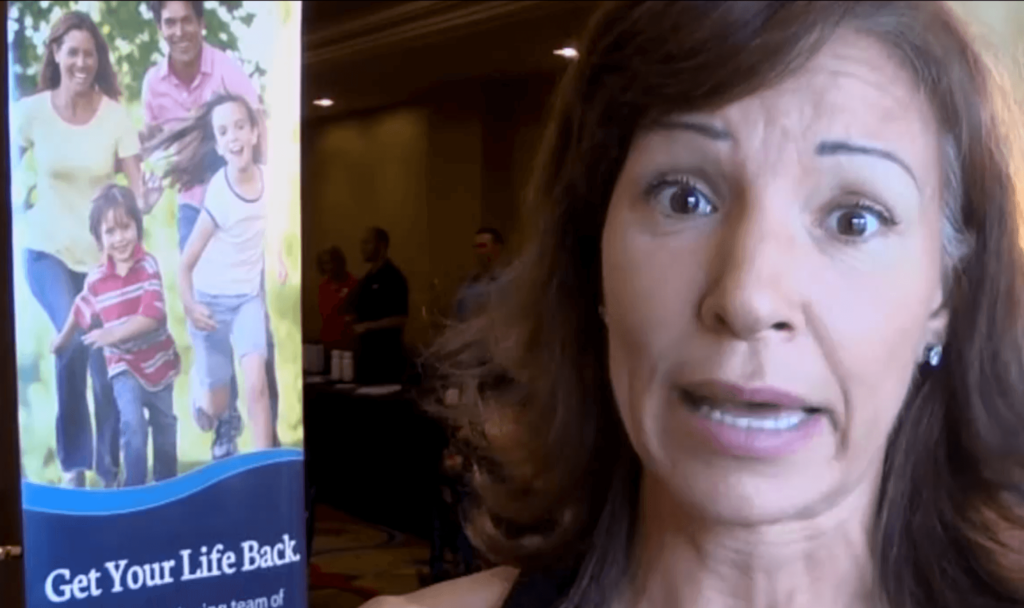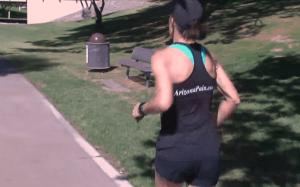Positive Energy
By Kevin Whipps
It’s 5 a.m. on a weekday, and a woman is lacing up her shoes to head out for a run. It’s not a jog for her health, it’s not about trying to reach some personal goal. It’s to forget. To try to work out the pain she felt from her recent divorce and sort out her own feelings. She wakes up her daughter and son, they lace up their shoes, and the family goes out running.
The son doesn’t last long. He’s tired, and he doesn’t want to run this one-mile loop for the umpteenth time. But the daughter feels the urge to keep up with her mother, so the two match pace and run the loop again and again. For the little girl, she feels natural. Strong. Good.
This is how an athlete is born.
A Watery Road
Tere Derbez-Zacher is a study in contrasts.
As a child, she learned to love running. As a teenager, she learned how to swim and soon took the world by storm. As the grandchild of two French immigrants in Mexico, Derbez-Zacher grew up speaking Spanish at school and French at home. She is also a Mexican and French citizen.
Now 40, Derbez-Zacher remembers her parents divorcing when she was 5, leaving her and her brother to be raised by their mother and grandparents. The family worked a lot to support the kids, and that meant there was no one to watch Derbez-Zacher and her brother at home. To fill the void, their mother would drop the two off at a private athletic club every day from 4 to 8 p.m., which is where Derbez-Zacher learned to love swimming as well. She showed some proficiency right off the bat, and soon was invited to go to nationals. But as the competition and practice requirements ramped up, the commitments became too much for her mother. “I guess she thought that I was just going to miss school forever,” Derbez-Zacher says. As a result, she stopped swimming and returned her focus to school.
After high school came college and then working toward her graduate degree. As she continued her education, Derbez-Zacher turned back to swimming. “I guess part of it was that I never really completed that cycle,” Derbez-Zacher says. “I like to finish what I start. If I want to get into something, I either do it all the way, or I’d rather not. I’m black and white.”
The competitive spirit was still very much alive in Derbez-Zacher at age 24, but her coach at the time told her she was too old and he wasn’t going to waste his time training her. Initially, she was devastated by his hurtful words, but soon changed her mind. “No one can tell me what I can or cannot do. I am the only one that determines how far I can go,” she explains. At the time she thought, “Maybe I will never be the next big swimmer, but I at least have to try.”
She found a new coach, a man who was around her age and believed, as she did, that she could be a professional swimmer. Her goal was to become a champion someday,
and the two focused intensely on her process. “Within eight months I was a national champion, and then two years after that I was a world champion,” Derbez-Zacher says. As she stood there, holding her medal in Morocco in 1998, she knew that it was just the beginning.
Soon the sponsorships started coming in, and she joined the Mexican national team for a spell. She even qualified for the 2000 Olympic Games in Sydney. But she was going through a rough patch in her life, and decided she needed a fresh start. She walked away from swimming, moved to Mexico City and became a news anchor for a national network.
That’s right, Derbez-Zacher was now on TV, interviewing famous celebrities and reading the day’s events. “It was fun, but I was not happy,” she says. “I like to know that I am making a difference in the world.” Being a talking head on the tube wasn’t cutting it for her, so she had to make a shift. Keep on moving forward.
She moved to America and took a job at the Mexican consulate. But she ended up leaving for political reasons, much to her dismay. “I think that when a door closes, it’s that something better is coming up for you. You’ve just got to be open to receive it — to get it,” she says.
While in the States and going to school, she decided to use her teaching background to volunteer at a local swimming school. There she met Kevin, a swimming instructor, and it wasn’t long before the two were married and had a beautiful daughter together. Things happen for a reason.
Running in Circles
One day Derbez-Zacher received a phone call from a friend. He was training for a marathon and wanted her to come out and practice with him. How long a run? 16 miles. No sweat.
At that point, Derbez-Zacher wasn’t running professionally, and didn’t really think about it much. But 16 miles — no biggie, right? “I say, ‘OK,’ because I think in kilometers. I’m like, ‘Sure, I’ll run with you. Why not?’” she says and laughs. But her competitive spirit kept pushing her forward; she would never show defeat. After a few more runs, her friend tried to prod her into running marathons, but Derbez-Zacher turned him down. Then he asked, “What about a triathlon?” Suddenly, she perked up. Swimming and running together? Perfect. What could go wrong?
“I started training [for the Olympic games], and I didn’t like it,” she says. “I hated swimming, because the swimming was long-distance and I was a sprinter. Biking was OK, but the swimming was open-water. When it came time to run, that was the only part that I really enjoyed.” The plan to do triathlons was scrapped, and Derbez-Zacher decided she was going to just run and train for the Olympics as a marathon runner. Soon she was running all the time, competing in marathons across the country. “The thing with training is that it’s better to undertrain a little than overtrain a little,” she explains. The problem was, in her joy of rediscovering her love of running, Derbez- Zacher was overtraining. And soon that nagging pain in her leg became something she just couldn’t ignore. It was time to get help.
Derbez-Zacher went through several different doctors. Some of them thought she might have a stress fracture in her leg, but nothing they tried could produce results. Ultimately,
she ended up at Arizona Pain in Scottsdale. At first, she was skeptical: Could this pain doctor really help her solve her problem?
After her visit, Derbez-Zacher found out she had a bulging disc, putting her L4 and L5 vertebrae out of alignment. In turn, that was placing pressure on the nerve that ran into her leg. But after a few shots and a visit with the chiropractor, Dr. Moore, she was sorted out and good to go. Three weeks after that initial visit, she was on the road again.
The Finish Line
Today, Derbez-Zacher is training to run in the 2016 Olympic games. She’s already pre- qualified for the Mexican team, but is also training for the U.S. Olympic Trials. She’s working as a teacher again off and on, and having fun with her daughter and husband. She’s also very, very busy.
But every day she wakes up, laces her shoes and goes for a run. She’s not running to forget, or to improve her health, but to meet a personal goal. She wants to become a world champion again — this time in a completely different sport, competing against people close to half her age. It’s an uphill battle, but with every step forward on the pavement, she gets that much closer to her goal. She feels natural. Strong. Good. This is how an athlete lives.

